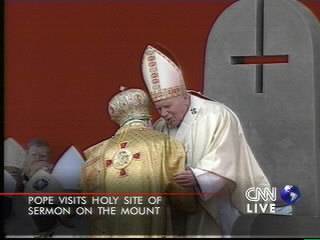

The following picture was found on the CNN website.
Url: http://cnn.com/SPECIALS/views/y/2000/03/kessel.pope.mar24/
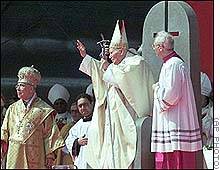
The following picture was found on the Time website. What is
interesting about this picture is that even within the picture
you can still distinctly see the inverted cross.
Url: http://www.time.com/time/daily/0,2960,41307-101000323,00.html
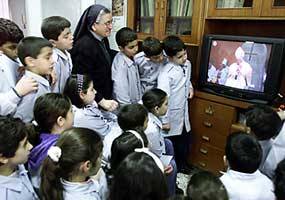
The following picture was found on the CBS website.
Url: http://www.cbs.com/network/htdocs/pope_jpII/galilee_02.html
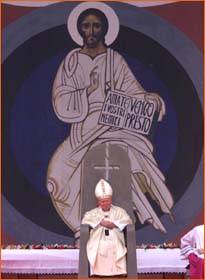
The CBS caption says,
"The pope sits on the altar at Korazim. The backdrop depicts Christ with an open book that reads, 'Love your enemies, I will come soon.' "
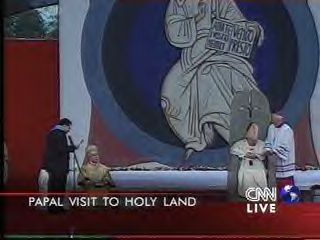
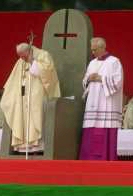
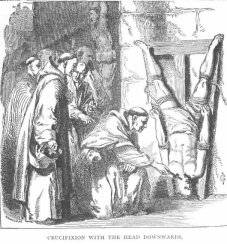
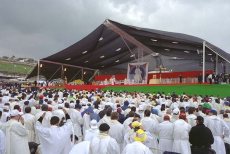
I recognize that Roman Catholics associate the upside down cross with the apostle Peter's crucifixion in argument for apostolic succession which is then used to support the Roman Catholic distinctive of papal infallibility, a very late dogma. However, Protestants argue that the Church is founded upon Jesus Christ. But, for the sake of explanation let us visit Matthew 16:18-19 which reads,
And I tell you that you are Peter, and on this rock I will build my church, and the gates of Hades will not overcome it. 19 I will give you the keys of the kingdom of heaven; whatever you bind on earth will be bound in heaven, and whatever you loose on earth will be loosed in heaven."
First for the Protestants:
Sheldon's "The Chief Apostles," (History of the Church, vol. 1, Hendrickson Publishers, reprint, 1999, pp. 68-78) spends quality time refuting the presumptions of the Roman Catholic understanding of this passage in this section of his first volume of church history.
Sheldon writes in a footnote that "There is no motive, on Protestant grounds, to deny that Christ spoke of Peter as a foundation, provided the proper considerations are added: namely (1), the tenor of the New Testament makes it perfectly plain that the words in Matthew were not applied to Peter in an exclusive sense, and denote only that he was a conspicous stone in the foundation; (2) to be a foundation means, in connection with any human agent, only to do the work of a founder; (3) the office of a founder is not a thing of inheritance or transmission. One can build upon the foundation laid by Peter. One can even imitate in a measure Peter's work by planting Christianity in new regions. But proper succession is out of question. As well think of a continuous succession of founders of the American Republic as of any one being heir to Peter's place in the foundation of the Church" (ibedem, p. 70).
Second, for the Roman Catholics:
Dr. Dayton observed that Binding and Loosening is the hermeneutical key to unlocking the meaning of this passage. "'Bind' (deo) and 'loose' (lou)," he wrote, "are common words for tie, attach, fasten, join, or otherwise restrict or restrain--and the opposite. The rabbis used these words of judicial decisions in binding duties and forgiving sins. And Jesus used them in Matt. 19:19; 18:18; and John 20:23. When the Roman church was trying to establish its primacy, these verses were claimed to authenticate sacerdotalism--the idea that Jesus authorized Peter and his successors to make binding demands and forgive sins. Such claims are without historical or scriptural validity. There is no instance in the NT of anyone's having practiced sacerdotalism, nor is there record from the first two centuries of the Christian era of anyone's using these verses to support the system. Nor does any Greek writing Ante-Nicene father cite these passages to support such a doctrine."
Dr. Dayton said of Peter's authority,
The judicial function of Peter or the disciples did not lie in a personal authority distinct from the gospel. Peter was a little stone (petros). Jesus himself is the living Rock (petra)--Matt. 16:18; 1 Pet. 2:8. The authority is in the Word of God proclaimed. It binds and looses.
The perfect and future tenses in all three verses indicate a caution as well as a commission in the gospel proclamation. These terms, properly interpreted, affirm that God has already bound or loosed by the gospel. The perfect tense in John indicates the present abiding result of completed action. The future tense in Matthew indicates the future abiding results of the then completed act. "Whose soever sins ye remit, they are [already in a state of having been] remitted," etc. The keys are the gospel and only the gospel (Wilbet T. Dayton, Binding and Loosening, Beacon Dictionary of Theology, Kansas City, MO: Beacon Hill Press, 1983, p. 77).
But of further interest is understanding how this passages is played out within redemptive history. Here I quote from 1001 Bible Questioned Answered, pp. 129-130:
Notice that in this verse, as in the 18th, the pronouns are singular. "Thee" and "thou" cannot apply to the whole company of apostles. If the others were included the pronouns would be "ye" and "you." The passage here must not be confused with Matthew 18:18, which deals with Church discipline. Here in 16:19 Peter alone is in view. Observe also that the keys are not in Heaven, but rather to the Kingdom of Heaven.
The act of Christ in delivering the keys of the Kingdom of Heaven onto Peter's hands, with authority to bind or loose, will become clear if we are careful to search for its meaning only in Scriptures themselves. The Lord Jesus was about to leave the earth, to be absent for a long time. It was necessary that the King, before His departure, should make it known who could enter the Kingdom and upon what conditions. The New Testament had not yet been written. He here selects Peter, His first convert, to speak for Him in this regard.
If we carefully trace Peter's movements after his Lord's departure, we shall find that it is he and he alone who opened the doors of the Kingdom of Heaven. There were three of these keys received by Peter from the Lord Jesus' hands. The first was used on that great day of Pentecost, when Peter was the spokesman and when he opened the doors of the Kingdom to the people of Israel. "The promise is unto you," said he, "and to your children, and to all that are far off, even as many as the Lord our God shall call" (Acts 2:39; cf. Dan. 9:7). To be sure, the other disciples also preached on that day, but Peter had to be present and approving. He was the chief spokesman.
Again after the persecution that arose in connection with the death of Stephen, Philip went to Samaria and preached to the Samaritans. But, though many believed the Word, the Holy Spirit fell on none of them. "Now when the apostles that were at Jerusalem heard that Samaria had received the Word of God, they sent unto them Peter and John: who, when they were come down, prayed for them, that they might receive the Holy Spirit, for as yet it was fallen upon none of them: only they had been baptized into the name of the Lord Jesus. Then they laid their hands on them, and they received the Holy Spirit" (Acts 8:14-17, R.V.). This was Peter's second key. He had now opened the doors of the Kingdom to the Jews and the Samaritans.
The third and last key was used in Acts 10, to open these doors to the Gentile world. Cornelius, the Roman Centurion, was commanded by an angel of God to send to Joppa for Peter; and Peter, by the vision of the great sheet, was shown that even the unclean Gentiles were no longer unclean, for God had cleansed them. Peter went to the house of Cornelius and preached the Gospel to those assembled there.
Peter was not the apostle to the Gentiles; that was Paul's office, and Paul was converted in the preceding chapter. But Peter, the apostle to the circumcision, must be the first to take the Gospel to the uncircumcision, for Peter had the keys. In each of these three instances, God showed, by the visible descent of the Holy Spirit upon the hearers, that what Peter was doing upon the earth was ratified in Heaven.
Never again was there any use for the keys of the Kingdom, for the doors were wide open, so that all who would might come. In the case of the Ephesians, who had received only John baptism (Acts 19), Peters presence was not needed, for he had already opened the Kingdom to 'all' Gentiles.